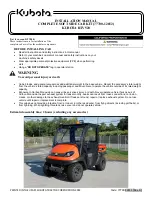
4. Product Performance
NO.
Items
1
-20°C
Testing Method
Criteria
Discharge
Temperature
Characteristics
At 25±5°C
discharge the battery with the current of
0.33C to the cut-off voltage and record charge
capacity. Store the battery at various temperatures
for 2h and discharge the battery with 0.33C to the
cut-off voltage.
0°C
25°C
55°C
≥70%
≥80%
≥100%
≥95%
Charge the battery to full capacity and store it for 28
days, and then discharge it with 0.33C to the cut-off
voltage.
Charge Retention
ability
Residual
capacity ≥80%
Internal resistance
≤15mΩ
50% battery SOC state frequency of 1 KHZ ac
resistance tester.
Discharge with the current of 0.33C until it can’t
discharge, and then rest it for 1h. Charge the battery
following CC (0.33C)/CV (14.6V) mode to full capacity,
and then rest it for 1h. Repeat above process until full
charged capacity is no more than 80% of normal
value. Accumulated times is defined as cycle life.
2
Cycle life (DOD%100)
≥2500 cycles
3
4
Recovery
capacity ≥90%
5. Protective Circuit Specification
The batteries are supplied with a LiFePO4 Battery Management System (BMS) that can monitor and optimized
each single prismatic cell during charge & discharge, to protect the battery pack overcharge, over discharge,
short circuit. Overall, the BMS helps to ensure safe and accurate running.
Items
Over-charge protection for each cell
Specification
Content
3.90±0.04V
Over charge
Over-charge release for each cell
3.60±0.04V
Over-charge release method
Under the release voltage
UE-12Li200BL
Though
,
user can read the battery system information
such as voltage, current, SOC, temperature…
and so on.
Communication
Function
Bluetooth
5
03
























